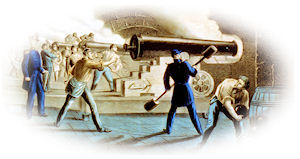STEAMER BALTIC,
New York, April 19, 1861.
SIR: I sailed from New York in this vessel Tuesday morning, the 10th instant, having dispatched one steam-tug, the Uncle Ben, the evening previous to rendezvous off Charleston. The Yankee, another chartered tug, followed us to the Hook, and I left instructions to send on the Freeborn.
We arrived off Charleston the 12th instant, at 3 a.m., and found only the Harriet Lane. Weather during the whole time a gale. At 7. a.m. the Pawnee arrived, and, according to his orders, Captain Rowan anchored twelve miles east of the light, to await the arrival of the Powhatan. I stood in with the Baltic to execute my orders by offering, in the first place, to carry provisions to Fort Sumter. Nearing the bar it was observed that war had commenced, and, therefore, the peaceful offer of provisions was void.
The Pawnee and Lane immediately anchored close to the bar, notwithstanding the heavy sea, and though neither tugs or Powhatan or Pocahontas had arrived, it was believed a couple of boats of provisions might be got in. The attempt was to be made in the morning, because the heavy sea and absence of the Powhatan’s gunboats crippled the night movement. All night and the morning of the 13th instant it blew strong, with a heavy sea. The Baltic stood off and on, looking for the Powhatan, and in running in during the thick weather struck on Rattlesnake Shoal, but soon got off. The heavy sea, and not having the sailors (three hundred) asked for, rendered any attempt from the Baltic absurd. I only felt anxious to get in a few days’ provisions to last the fort until the Powhatan’s arrival. The Pawnee and Lane were both short of men, and were only intended to afford a base of operations whilst the tugs and three hundred sailors fought their way in.
However, the Powhatan and tugs not coming, Captain Rowan seized an ice schooner and offered her to me, which I accepted, and Lieutenant Hudson, of the Army, several Navy officers, and plenty of volunteers agreed to man the vessel, and go in with me the night of the 13th. The events of that day, so glorious to Major Anderson and his command are known to you. As I anticipated, the guns from Sumter dispersed their naval preparations excepting small guard-boats, so that with the Powhatan a re-enforcement would have been easy. The Government did not anticipate that the fort was so badly constructed as the event has shown.
I learned on the 13th instant that the Powhatan was withdrawn from duty off Charleston on the 7th instant, yet I was permitted to sail on the 9th, the Pawnee on the 9th, and the Pocahontas on the 10th, without intimation that the main portion–the fighting portion–of our expedition was taken away. In justice to itself as well as an acknowledgment of my earnest efforts, I trust the Government has sufficient reasons for putting me in the position they have placed me.
I have the honor to be, your obedient servant,
G. V. FOX.
The Baltic has been chartered for one month.
Hon. SIMON CAMERON,
Secretary of War, Washington.







